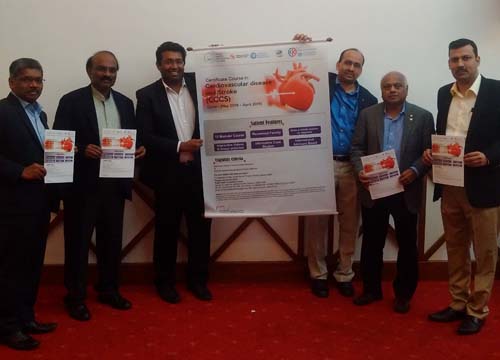
Kochi, Kerala, India/News Voir//–
- Advancing evidence-based learning in CVD & Stroke for primary care physicians, the course is an international partnership between Public Health Foundation of India (PHFI), World Heart Federation (WHF), Population Health Research Institute (PHRI), American College of Cardiology (ACC) and Centre for Chronic Disease Control (CCDC).
- This unique 12 modular executive on-the-job course will be conducted at 50 different centers in India, aiming to train andbuild capacity of over 2000 Primary Care Physicians to improve patient outcomes by enabling early diagnosis and evidence based treatment.
Recognizing that Cardiovascular disease (CVD), including ischemic heart disease and strokes are an existing public health challenge and a leading cause of death globally which requires an immediate need to build capacity, improve and enhance awareness amongst primary care physicians, the Public Health Foundation of India (PHFI) along with international academic and knowledge partners The World Heart Federation (WHF), Population Health Research Institute (PHRI), The American College of Cardiology (ACC) and Centre for Chronic Disease Control (CCDC), launched first of its kind Pan-India Certificate Course on Cardiovascular Disease and Stroke (CCCS).

This course will be initially launched in India and then extended to other regions of the world with the goal of reaching all continents within 5 years. When fully operationalized, it is expected that this course will train a huge number Primary Care practitioners and measurably increase their capacity and knowledge to address CVD, ultimately drive the reduction of premature CVD mortality globally.
Cardiovascular Disease (CVD), including ischemic heart disease and stroke are the leading cause of death globally. In 2013 there were over 17 million CVD deaths, of which about 6 million were premature (in those <70 years). Most CVD events (e.g. stroke, myocardial infarction, sudden death) occur in people who already have CVD, hypertension or are smokers. To make the scenario grimmer, currently about 1 billion people have hypertension with less than half being diagnosed and receive any Blood Pressure (BP) lowering treatments, and of these fewer than 20% have their BP controlled, which ultimately makes this population susceptive of CVD and Strokes. Of the 50 million people with CVD, fewer than 5 million receive at least three out of four of the recommended drugs for secondary prevention, making them more vulnerable. In India, Cardiovascular disease is a major cause of disability and premature death and is advancing rapidly. Overview of population surveys conducted over two decades in India reported 9-fold increase in the prevalence of Coronary Heart Disease in India and it has been estimated that there will be doubling of deaths due to cardiovascular disease (CVD) in India. Improving hypertension control and secondary prevention, (particularly in low & middle income countries like India where use is lowest) along with reducing tobacco use is the most powerful strategy to reducing CVDs globally. Even a partial achievement of this strategy will achieve the WHO target of a 25% reduction in NCD premature mortality. Therefore there is a need to improve the capacity of Primary Care Physicians to implement these strategies in clinical practice.
Announcing this unique collaborative course Prof. D. Prabhakaran, Vice President – Research and Policy, PHFI said, “We at the Public Health Foundation of India are committed to improving health and healthcare practices. Through the Certificate Course on Cardiovascular Disease and Stroke, we aim to tackle one of the most formidable public health challenges of this century—reducing the burden of heart disease and stroke. Heart disease and stroke are among the nation’s leading causes of death and disability, and despite this condition having a huge individual and societal burden, it is under-addressed within the population level — both rural and urban and also at the medical fraternity level, who are poorly trained to diagnose this condition earlier in a patient. As the numbers increase for patients diagnosed, the need for an advanced educational preparation for physicians needs to be developed. With an aim to make an impact in CVD and stroke, PHFI along with its global partners proudly announces this pan-India course. This course is a well-designed compendium that will help tackle the challenges of disease detection, management, and further familiarizing primary care doctors with advancements in CVD and Stroke management.”
The aim of this course is to build the capacity of Primary Care Physicians (PCPs), who are the foundations of health care in all countries in the world. Between 50% and 70% of adults see their PCPs every year for some ailment. This presents an excellent opportunity to implement strategies for prevention of CVD through opportunistic screening for hypertension and implementing simple lifestyle modification and drugs treatment for hypertension and for secondary prevention. Therefore by empowering family practitioners and other primary care personnel in CVD prevention substantial reductions in CVD is likely within the existing health care systems in most countries. The programme presents a model that can be scaled up in few years to China, Latin America and Africa.
Emphasizing the need for improed management and reduced burden of CVD through strengthened capacity of primary care physicians to prevent, detect and manage Cardiovascular Disease (CVD) and Stroke, Dr. Salim Yusuf, President, World Heart Federation in his address said, “Primary care is the cornerstone of prevention of heart diseases and strokes and the first step in diagnosis and initial management. This includes detecting hypertension and initiating treatments, continuing the care of patients after they have been stabilized by specialists and promoting smoking cessation .These 3 strategies can make a big impact. That is why the World Heart Federation in partnership with the PHFI are launching this course in CVD prevention in primary care. After starting this course in India, we plan to adapt it to other countries and launch the course in different regions of the world.”
“The ACC mission is to transform cardiovascular care and improve heart health, and programs like this are key to our ability to work with partner organizations around the world to achieve this mission,” said Dr. Daniel José Piñeiro, M.D., FACC, Chair of the American College of Cardiology Assembly of International Governors. “The ACC is poised to leverage its 52,000 worldwide members to assist in expanding cardiology education to primary care doctors where there is a huge opportunity to make an impact.”
The Certificate Course on Cardiovascular Disease and Stroke will be of a duration of twelve months (12 modular course) with once-a-month contact sessions, which will be conducted on designated weekends at regional centers across India with standardized slides, case studies and group work exercises. The course will comprise of 15 global scientific leaders in the field of cardiology who shall act as National Experts for this program guiding content, curriculum, delivery methods, conducting faculty briefing sessions and participating in the training sessions in addition to monitoring and evaluating progress. In India, there will be 50 expert faculty members delivering the course. Faculty members will be selected on the basis of criteria which should include a specialized degree in cardiology or equivalent with a preference for DM/DNB/MS Cardiology; major proportion of current practice related to CAD, Stroke and its complications; and with the required infrastructure to meet the requirements of this project (out-patient clinic, in-patient facility, a training room, computer with internet connectivity and a patient educator/ counselor/ nutritionist) either in private settings or with the associated hospitals. Each center will have only one faculty and the faculty to participant ratio of 1:20 per center. The participant eligibility criteria shall include either post-graduate degree in any medical field, preferably internal medicine or family medicine or medical graduate with at least three years of experience as a primary care physician. A rigorous quality improvement and evaluation system will be implemented, including pre- and post-testing, observer evaluation, and mid- and final- assessments. Successful completion of the programme shall include participation in 10 of 12 modules, submission of interim assignments and a final exit exam. The entire course content will be developed by the academic partners with inputs and support from PHFI and National Experts. The secretariat would be set up at PHFI, New Delhi for overall implementation, monitoring and coordination of the course.
Key Highlights
- Pan-Country program: This is a pan-country program initially launching in India with ambitions to have session conduction sites, participants, observers, faculty and national experts distributed across multiple geographies.
- Evidence Based Learning: The focus of teaching is based on evidence based learning with one-to-one interaction with experts in their respective field.
- Program Curriculum: Updated Curriculum is prepared by the academic partner and Technical Partner on the basis of inputs by 65 Experts. Curriculum will be updated annually with the inputs from all stakeholders and in context to the latest advancements globally.
- On-the-job training: The training is conducted once a month on designated weekends to ensure that the routine activities and commitments of all the stakeholders are not affected.
- Networking: Program establishes a network between national experts, faculty, and primary care physicians which strengthens the referral mechanism.
- Advancements: Participants are encouraged to attend various conferences and workshops and other training programs across the country. They will also be offered discounts being a participant of the certificate course.
-
Robust Monitoring and Evaluation: Robust internal and external monitoring and supervision activities. This enables a standard teaching protocol throughout the country.
First-of-its-kind Certificate Course on Cardiovascular Disease and Stroke (CCCS)





